Table of Contents
Do you want to travel around the globe but also fill your journey with inspiring and insightful words along the way? Whether it’s a phrase, proverb, fairy tale, or even a religious dictum – learning foreign expressions or travel words can open up a gateway of knowledge while enriching the experience of any trip.
Why Learn New Travel Words?
Learning travel words from other cultures can be a great source of inspiration, especially for those who love to travel. Exploring different languages and learning new travel words can broaden your vocabulary and allow you to express yourself in new and exciting ways. Incorporating travel words from other cultures into your writing or speech can add depth and personality to your communication.
Plus, it’s always satisfying to connect with people from other parts of the world on a deeper level. By embracing linguistic diversity, you can open yourself up to new ideas and perspectives, making you a more creative and culturally aware individual.
Here is our list of 27 travel words to elevate your trips and enhance your life experiences:
Abditory (Latin)
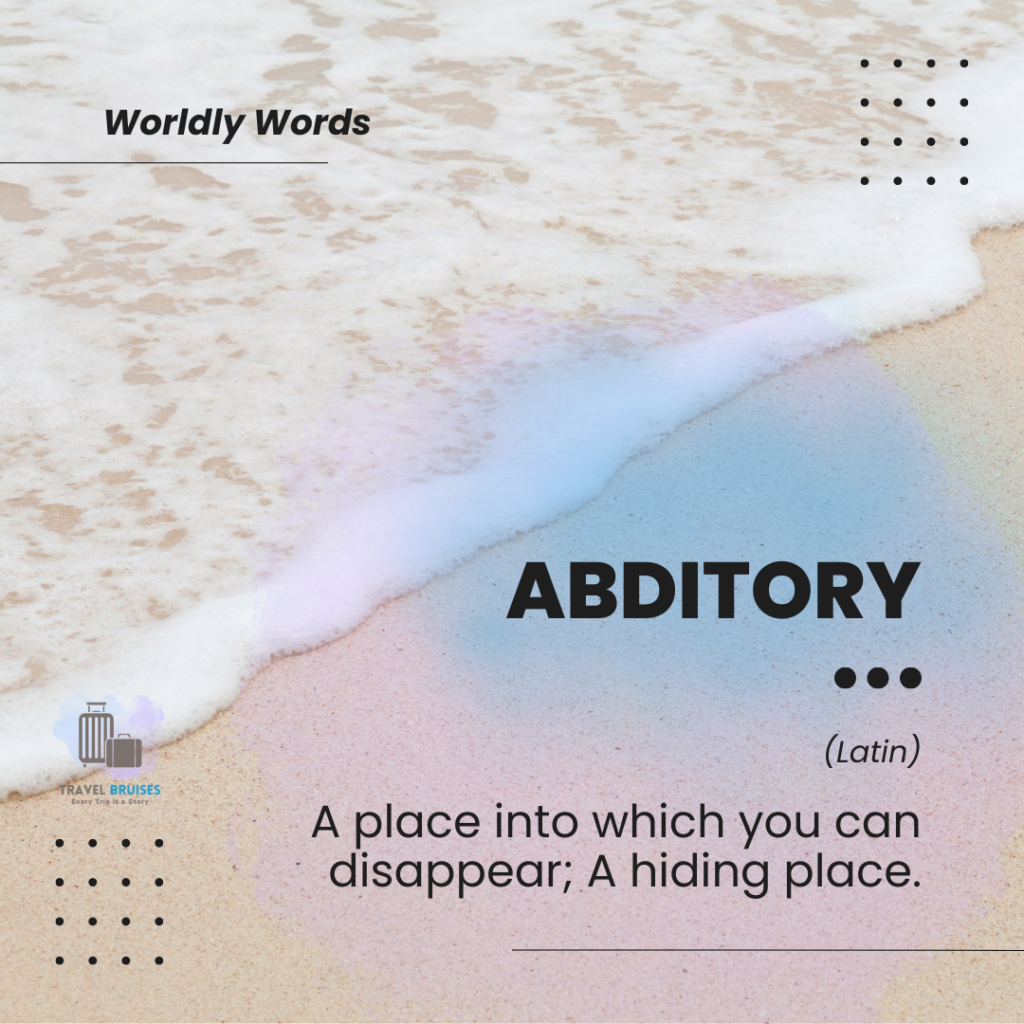
Abditory refers to a secret hiding place, often used for storing valuable or treasured items. The idea of having your own abditory can be quite inspiring, as it gives you a sense of privacy and security. Imagine creating your own hidden nook, filled with special mementos and memories from your travels. It’s a wonderful way to keep your experiences close to your heart.
Datsuzoku (Japanese)

This fascinating Japanese word captures a concept that’s highly valued in their culture. It means to break away from the norm, the established order, and pursue something that brings you joy. It’s about exploring new paths and seeking out experiences that fill your heart with excitement. For travelers, Datsuzoku can be incredibly inspiring and a reminder to let go of expectations and embrace the unknown.
Fernweh (German)
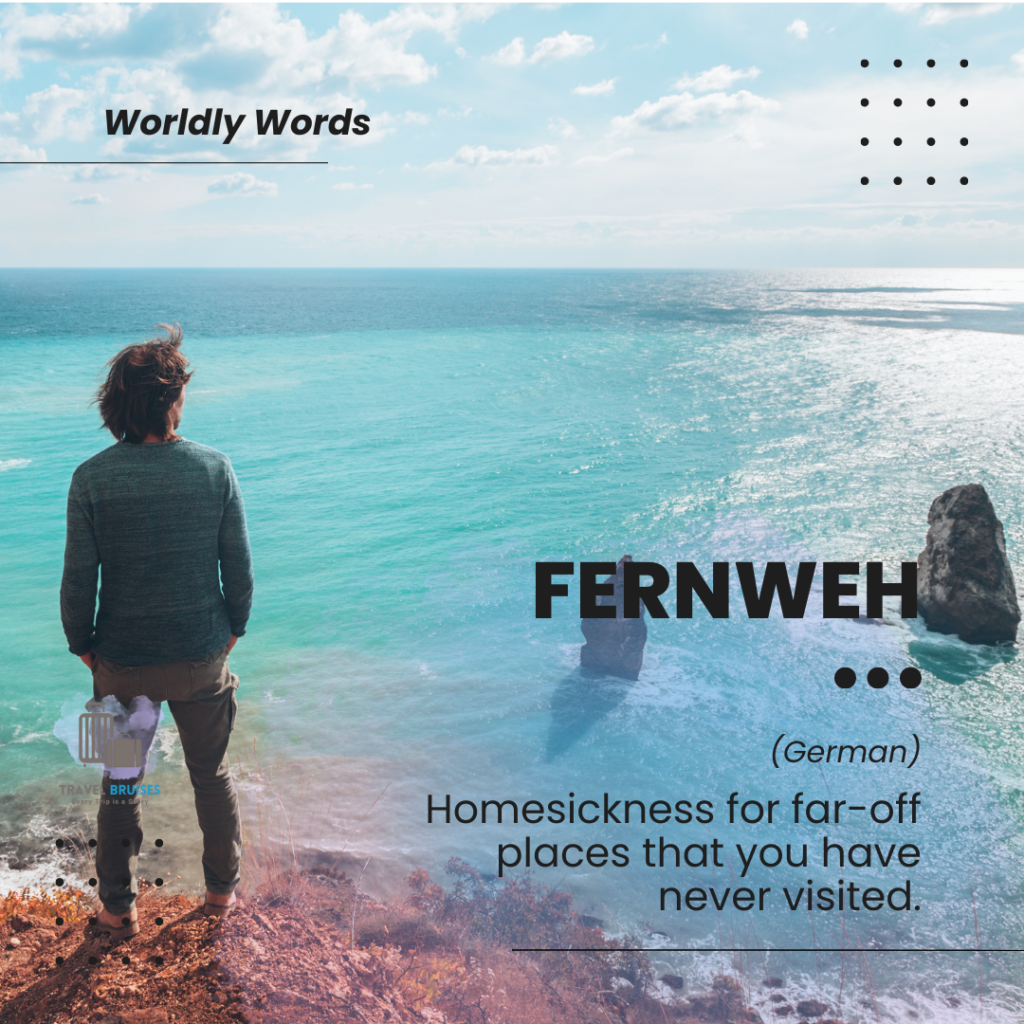
Are you feeling homesick for a place you have never been to? Maybe what you’re experiencing is Fernweh – a German word that translates to “wanderlust” or a strong desire to travel and explore new places. It’s that longing feeling you get when you see a photo of a beautiful landscape or hear someone talk about their travels. Fernweh is more than just an urge to wander, it’s a passion that drives you to experience all the beauty and wonder that the world has to offer.
Gemütlichkeit (German)

The German word is all about creating a cozy and comfortable atmosphere, often involving things like warm blankets, good food, and great company. It’s a feeling of relaxed contentment, of feeling at home while away from home. And isn’t that what travel is all about? Finding inspiration in new places, connecting with new people, and experiencing different cultures–all while feeling a sense of comfort and familiarity. Embrace the spirit of gemütlichkeit on your next adventure and see where it takes you.
Haneul (Korean)
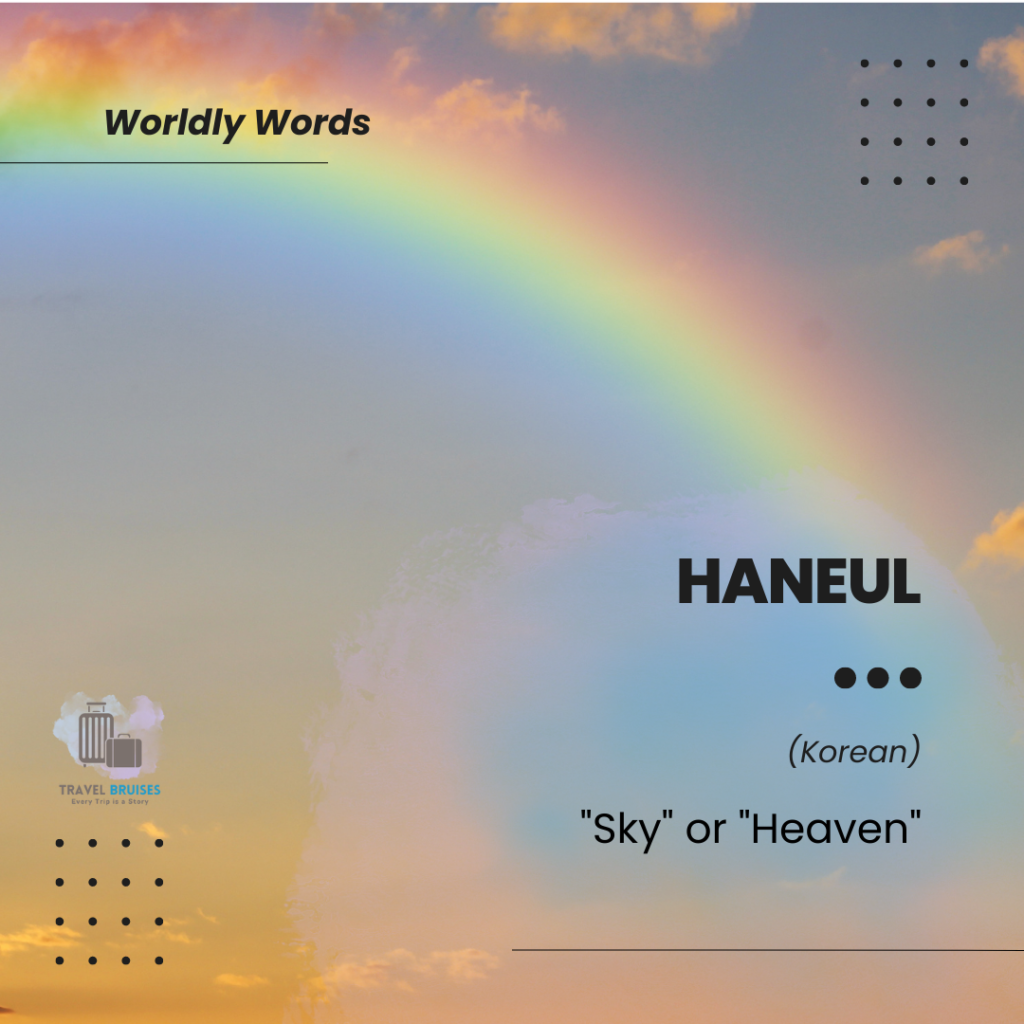
“Haneul” is a Korean word for “sky” or “heaven.” It is often used in Korean culture as a symbol of inspiration and hope. The vast and limitless nature of the sky inspires many to dream big and reach for the stars. In Korean literature and poetry, the word “Haneul” is often used to depict a sense of freedom and a connection to the divine.
Hanyauku (Namibian)
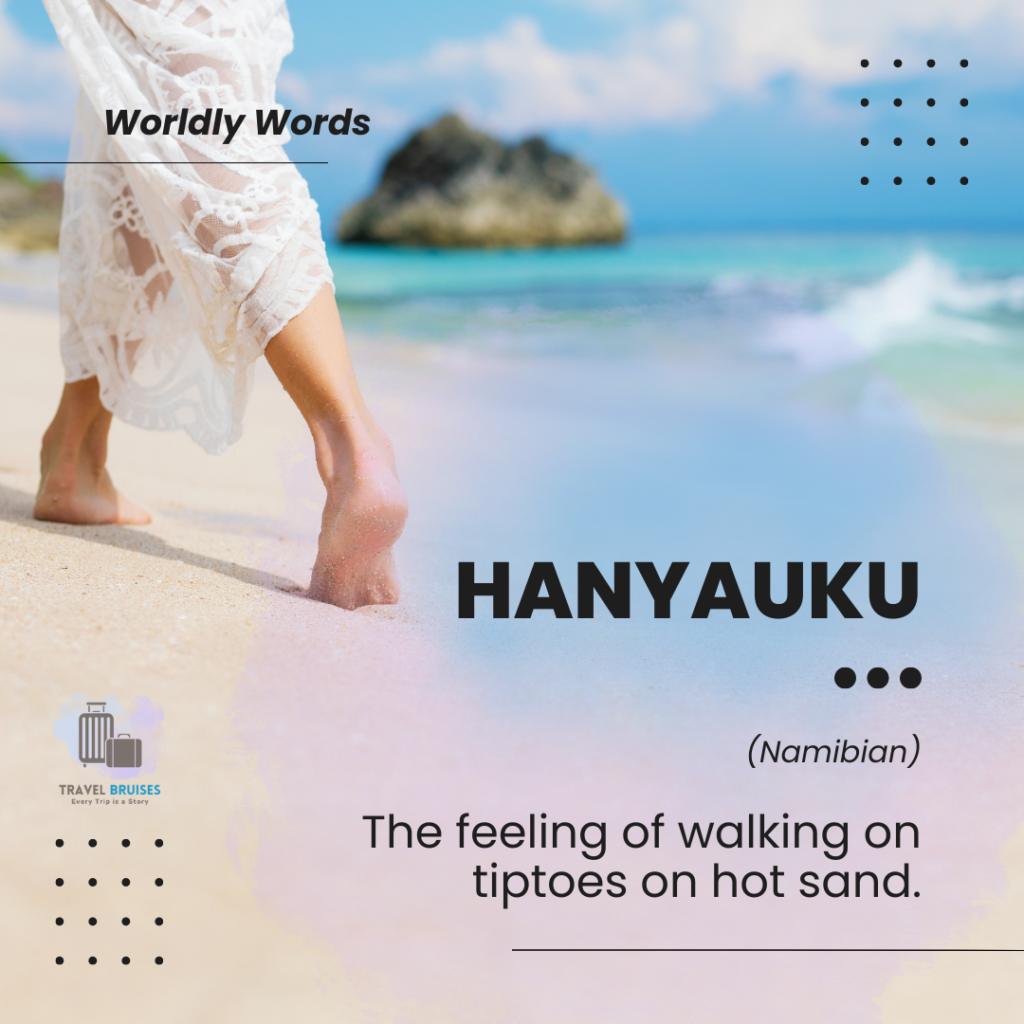
When it comes to travel, inspiration can come from the most unexpected sources. One such source is the word Hanyauku, which has a fascinating meaning when it comes to hot sand. In the Himba language of Namibia, Hanyauku refers to the art of walking on hot sand without showing any signs of discomfort. It’s an ancient practice that has been passed down through generations and is still used today. This incredible skill is a testament to the resilience and adaptability of the human body and serves as a source of inspiration for those looking to push their physical limits.
Hiraeth (Welsh)

While difficult to translate directly, hiraeth is often described as a longing or nostalgia for a place or time that may never have existed. It’s a complex emotion that speaks to our deepest desires to connect with the world around us and find meaning in our journeys. Whether you’re exploring new destinations or reminiscing on past adventures, hiraeth is the word that encapsulates all the beauty and mystery of travel in one succinct term.
Hygge (Danish)

Pronounced “hoo-gah”, it’s a term that describes the feeling of cozy contentment and warmth, often associated with a peaceful moment spent with loved ones. Although it’s difficult to translate directly into English, understanding what hygge means can inspire travel and a deeper appreciation for life’s simple pleasures. From curling up with a good book on a rainy day to sharing a meal with friends by candlelight, hygge encourages us to find comfort in the present moment and savor the joys of life.
Jayus (Indonesian)

This unusual word comes from Indonesian culture and refers to a joke that is so unfunny that everyone breaks out laughing. However, it’s often used to describe something that’s funny in an absurd way, which can inspire creativity and out-of-the-box thinking.
Kilig (Filipino)

“Kilig” is a Filipino term that describes the feeling of butterflies in your stomach, the thrill of excitement, or the happiness of being in love. It’s the natural high that one experiences when they feel inspired and touched by something or someone. Whether you’re traveling solo, with your partner, or with friends, kilig is a feeling that can positively impact your journey and give you those unforgettable moments.
Koi No Yokan (Japanese)
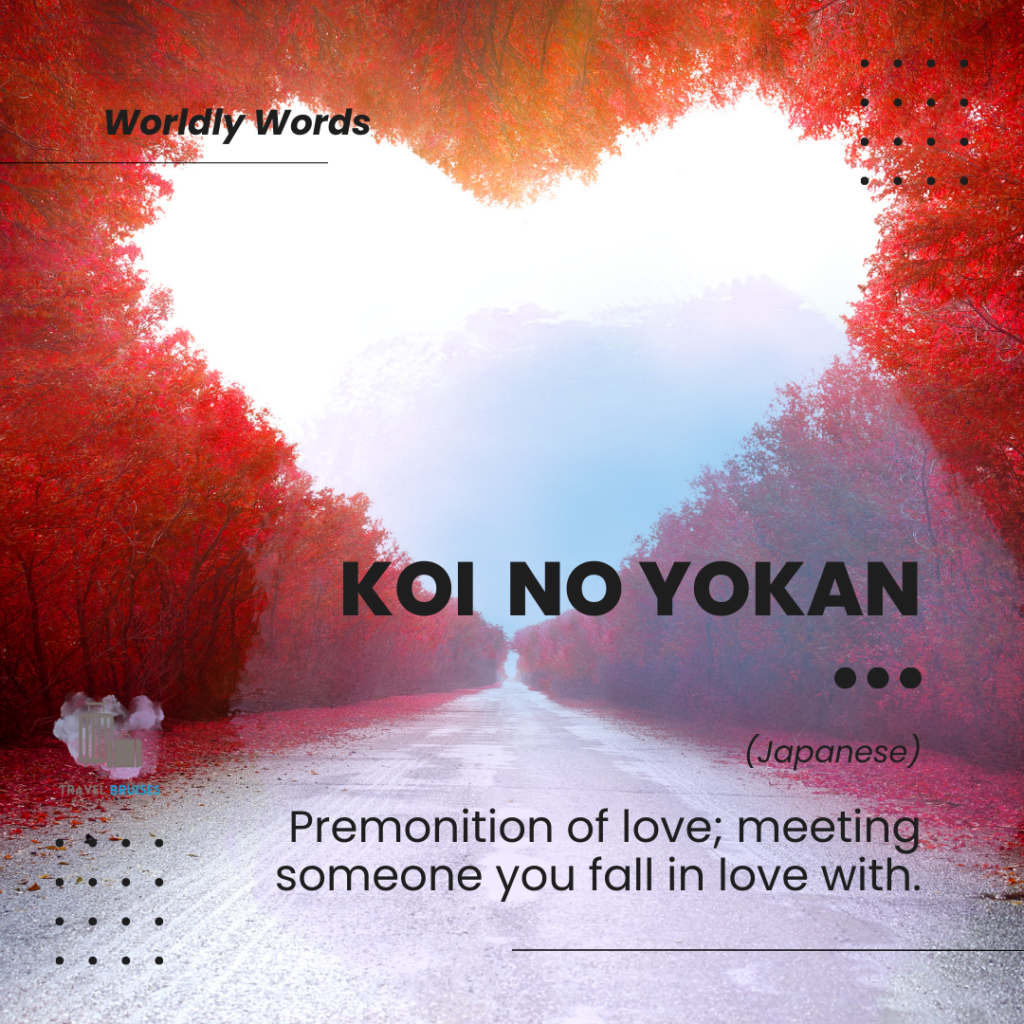
The Japanese term is often used to describe the feeling of knowing that you will soon fall in love with someone. However, it’s a phrase that goes beyond romantic love. It’s all about the feeling of intuition, the sense of knowing that something is about to happen. Koi No Yokan can apply to any situation, whether it’s a new job opportunity or a chance meeting with a stranger. The beauty of this concept lies in the anticipation and the mystery of what comes next. It’s a reminder that life is full of surprises, and we should embrace them with open arms.
Komorebi (Japanese)
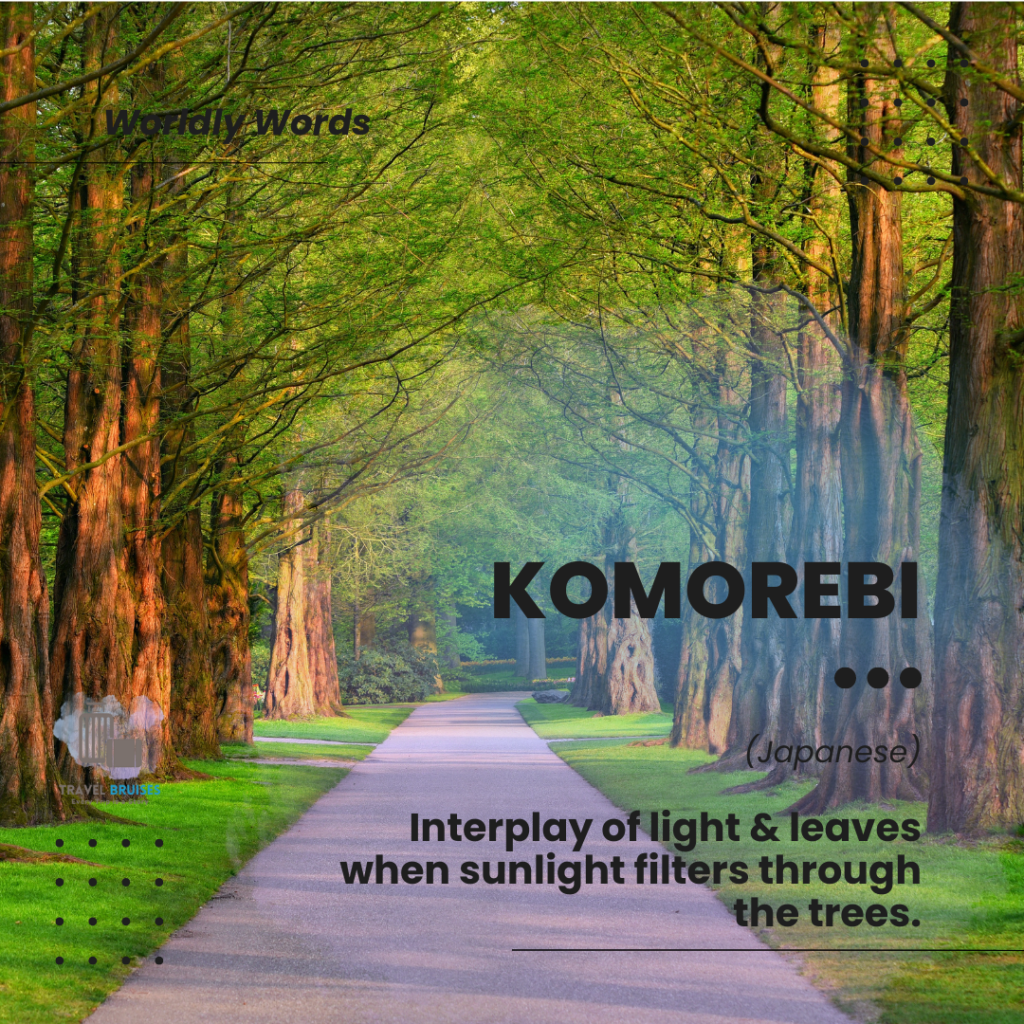
Have you ever strolled through a forest on a sunny day and noticed the way the sun’s rays filter through the leaves, creating a mesmerizing pattern on the ground? That dappled effect has a name: Komorebi. In Japanese, komorebi refers to the interplay between light and foliage and is often used to describe experiencing nature in a spiritual way.
La Dolce Vita (Italian)

If you’re planning a trip to Italy, you may have heard the phrase “La dolce vita” being thrown around. In essence, la dolce vita captures the idea of “the sweet life” – a lifestyle of leisure and pleasure. This phrase has become emblematic of Italian culture and the allure of travel to Italy.
Lebenskünstler (German)

In German, it loosely translates to “life artist,” someone who lives their life to the fullest and finds inspiration in the everyday. As a traveler, I have met many Lebenskünstlers along the way. They are the ones who embrace the unknown, take risks, and see beauty in the simplest things. They inspire me to live in the moment and approach life with a sense of curiosity and creativity.
Mamihlapinatapai (Yaghan)
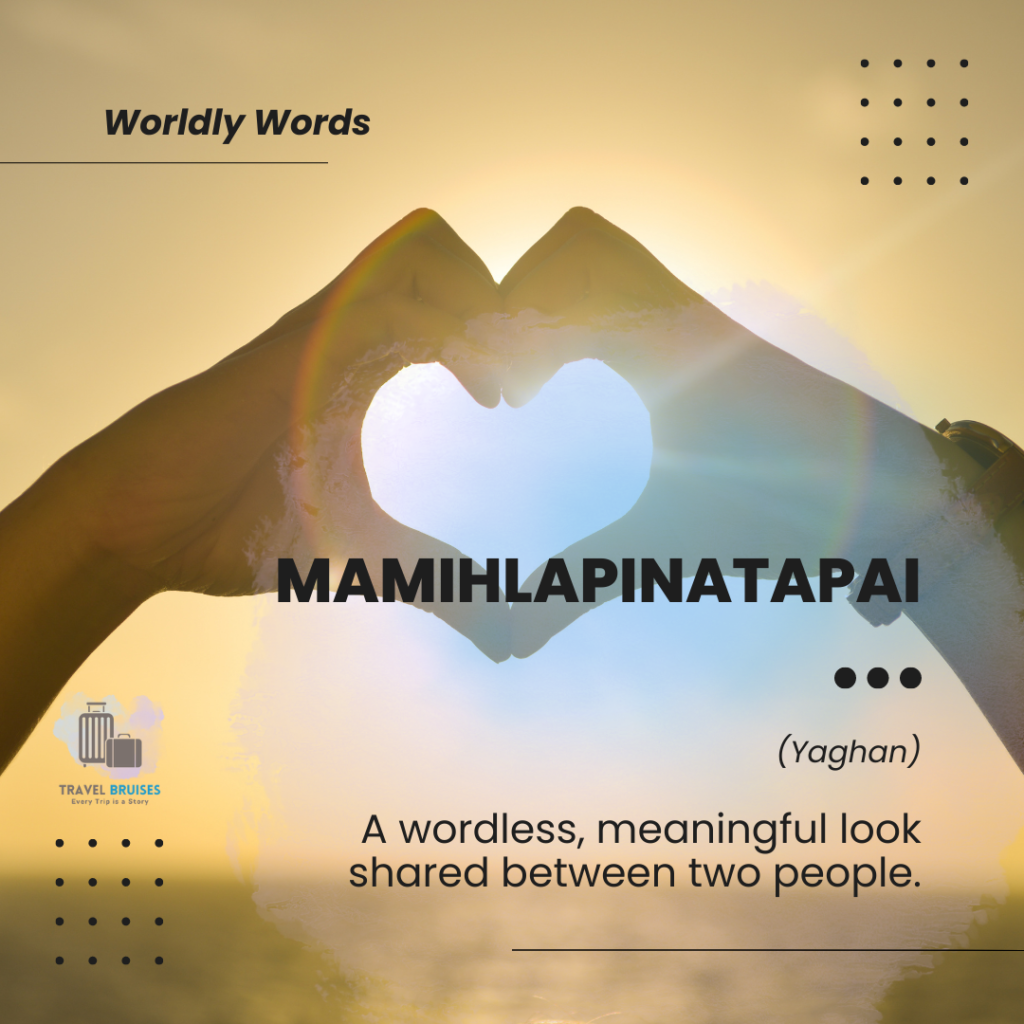
Hailing from the Yaghan language of Tierra del Fuego, this word is often cited as one of the most difficult concepts to translate into English. It refers to a meaningful, reflective, yet fleeting look between two people who both desire something but are hesitant to initiate it. While the literal definition may seem abstract, the concept can apply to all sorts of travel-related experiences: connecting with locals, exploring hidden corners of a new city, or simply taking a risk on an adventure.
Meraki (Greek)

Meraki is a beautiful Greek word that is often used to describe the intense passion and creativity that goes into creating something. It can be applied to anything, from cooking a delicious meal to painting a piece of art. This word is truly inspiring and can be used to encourage creativity and exploration in all aspects of life.
Pura Vida (Spanish, Costa Rican)

Translated literally, Pura Vida means “pure life.” However, it’s so much more than that. It’s a philosophy, a way of living, an attitude toward life. Pura Vida is all about enjoying the journey, taking things as they come, and appreciating the little things. It’s an inspiration to live life to the fullest, with a sense of gratitude and joy.
Resfeber (Swedish)

A Swedish word that describes the mix of emotions you feel when embarking on a journey, whether it’s adventure, anxiety, curiosity, or excitement. Essentially, it’s the feeling of butterflies in your stomach and a racing heart as you’re about to board a plane, train, or even a car for a road trip. Resfeber is a reminder that travel is not just about the destination, but the journey that takes you there, and it’s something that can provide inspiration to embrace the unknown and accept that the adventure of travel comes with a mix of emotions.
Saudade (Portuguese)

It’s a Portuguese word that doesn’t have a literal translation in English, but experienced travelers know what it means. It’s a feeling of nostalgia and longing for a place or person that’s currently far away. Even if you’ve never heard the word before, there’s a good chance you’ve felt saudade during your travels. It’s a bittersweet emotion that can inspire us to keep exploring the world, to stay connected with the people we meet, and cherish the memories we create.
Sisu (Finnish)
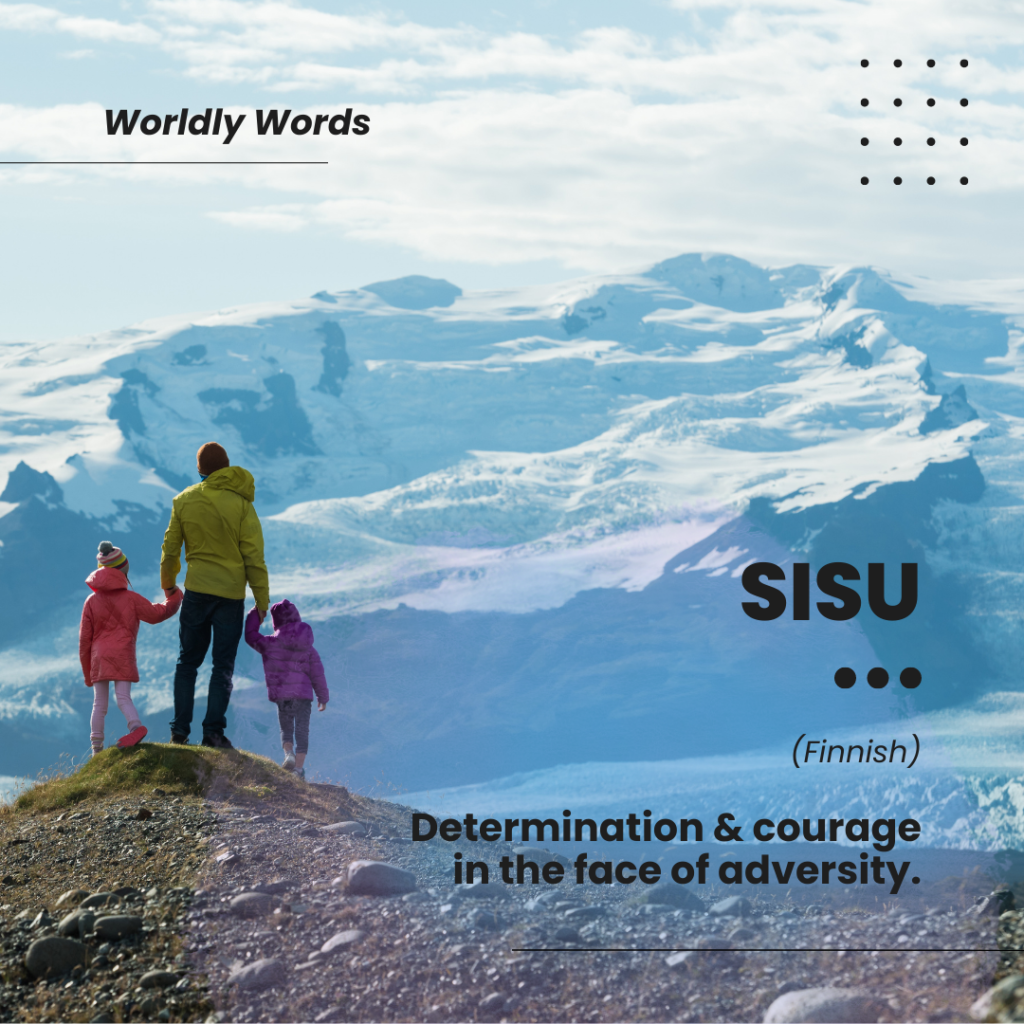
Sisu is an untranslatable Finnish word that describes a particular mindset. It conveys the idea of inner strength, tenacity, resilience, and perseverance in the face of adversity. It is a quality that Finns hold dear and derive inspiration from when facing tough challenges. Sisu can be found in the way they approach work, sports, relationships, and life in general.
Smultronställe (Swedish)

Smultronställe translates to “wild strawberry patch,” but it holds a deeper meaning for Swedes. It refers to a special place in nature that is known only to a few, a spot where one can escape the hustle and bustle of daily life and find inner peace. Smultronställe can inspire anyone to explore and uncover their own version of hidden havens around the world, whether it’s a deserted beach or a hiking trail. Don’t let the limits of technology stunt your travel dreams; let “smultronställe” be your guide to finding the next adventure that awaits.
Sobremesa (Spanish)
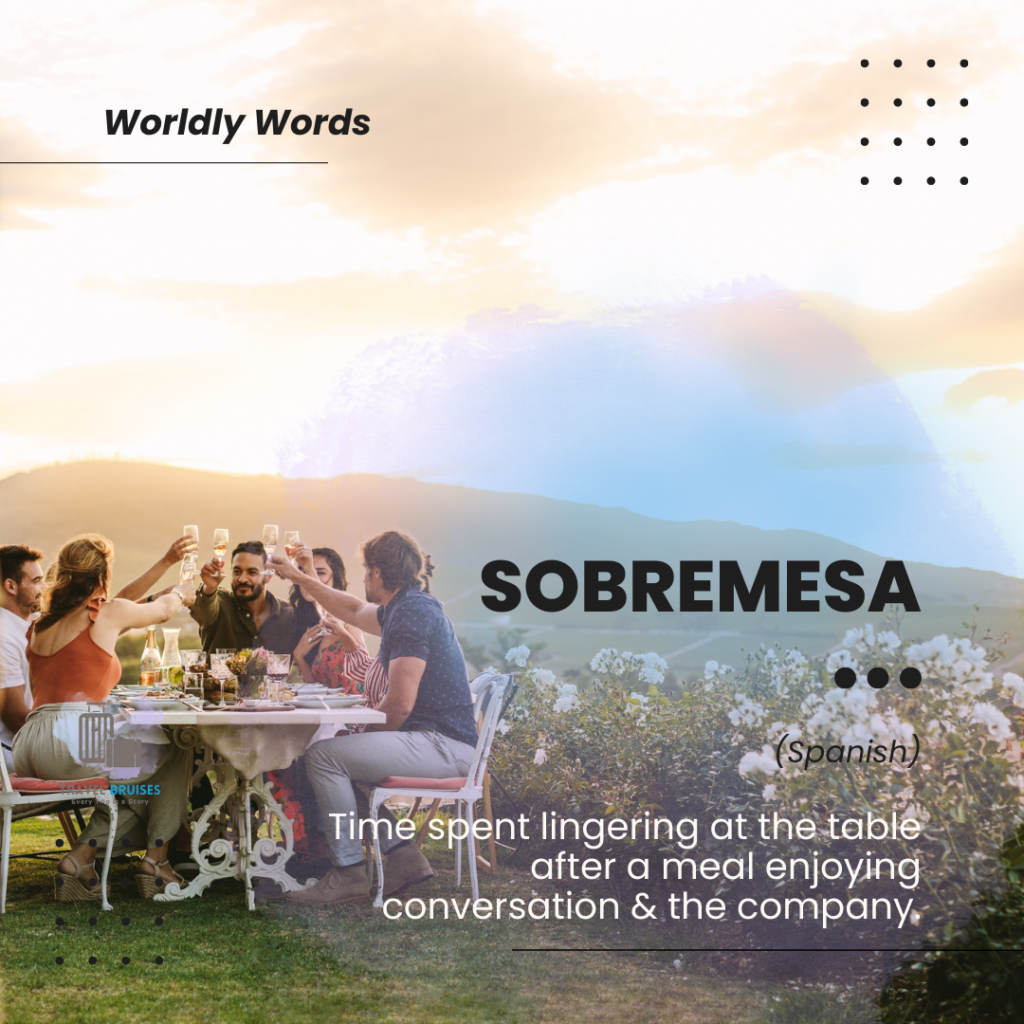
This phrase encapsulates the cultural tradition of post-meal conversation and relaxation. Sobremesa translates directly to “over table” and refers to the time spent lingering over food and drink while enjoying the company of friends and family. This concept is so important in Spanish culture that it has become a cornerstone of their way of life.
Tsundoku (Japanese)
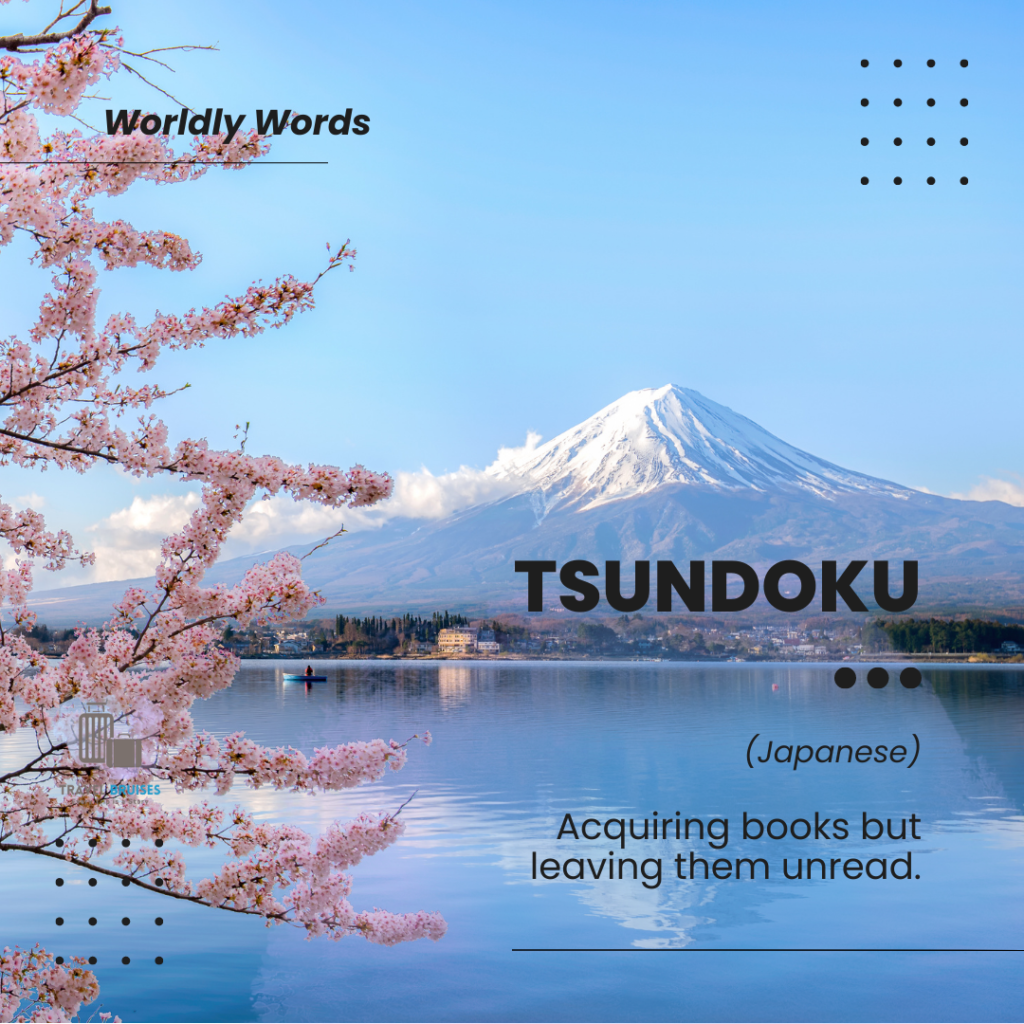
Tsundoku refers to the habit of acquiring too many books, but not having enough time to read them all. It’s a word that many of us can relate to, especially those who love to travel and seek inspiration through literature. Despite being a seemingly innocuous word, Tsundoku perfectly captures that feeling of excitement when we discover a new book we simply can’t resist, even if we still have a pile of unread books at home.
Ubuntu (Zulu)

This mystical, ancient word is a cornerstone of the country’s cultural identity and is held in high esteem by all who live here. At its core, ubuntu represents compassion, connection, and a sense of community spirit. It’s an idea that inspires people to look out for each other, and to recognize that every individual is an integral part of something much larger.
Vacilando (Spanish)

The Spanish term, often associated with writer John Steinbeck, encompasses the idea of wandering with a sense of purpose. It’s about exploring a place, whether new or familiar, with open eyes and an open mind. It’s about embracing uncertainty, taking detours, and discovering unexpected treasures. Vacilando invites us to be present in the moment and to let go of preconceived notions.
Wabi-sabi (Japanese)
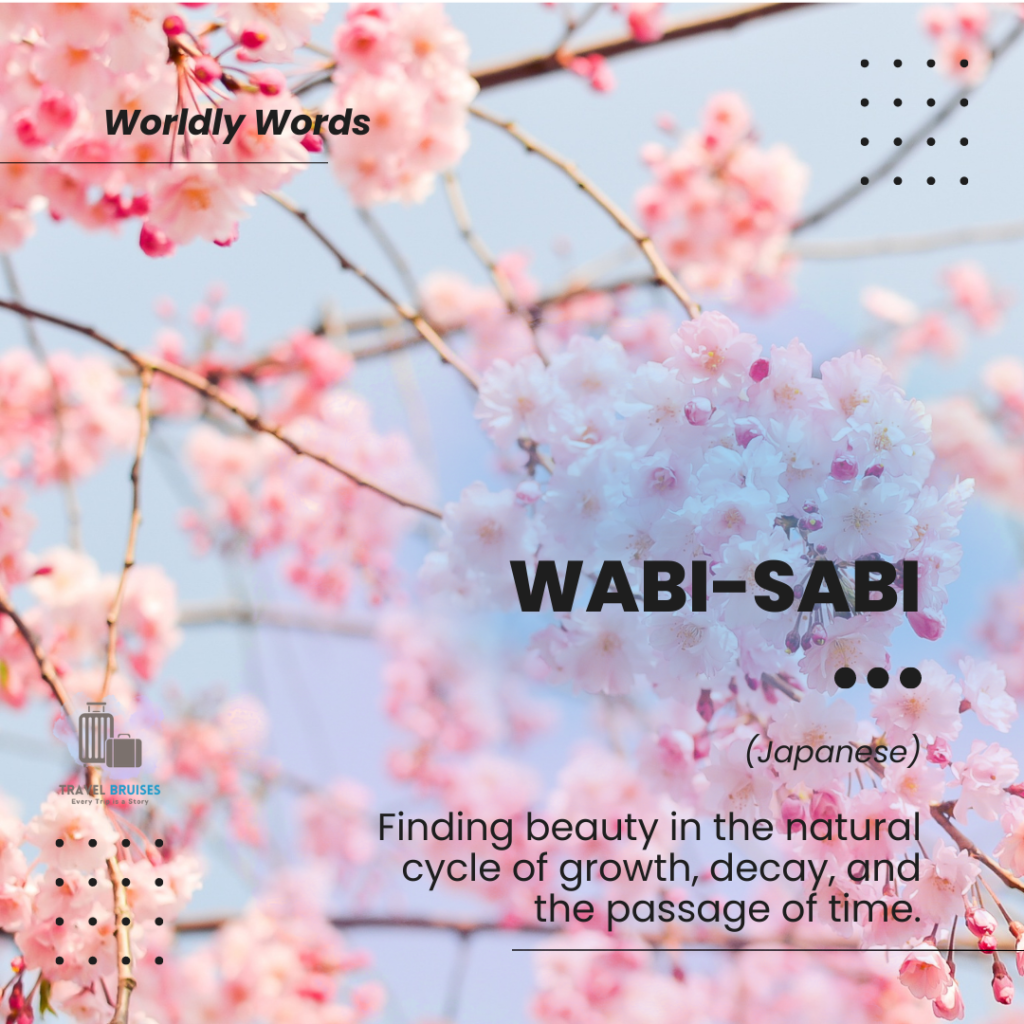
Originating from Japanese aesthetics, wabi-sabi is an idea that embraces the beauty of imperfection, simplicity, and nature. It celebrates the flaws and unique characteristics of objects and living things, rather than striving for perfection and uniformity. By traveling to Japan and experiencing the wabi-sabi lifestyle firsthand, you may find a new source of inspiration that encourages you to find beauty in the ordinary and appreciate the impermanence of life.
Schwellenangst (German)

This a German term that refers to the fear of crossing a threshold- a perfect word to describe that overwhelming feeling of apprehension before taking a leap of faith into something new. For those who love to travel, Schwellenangst can be a common experience, particularly when visiting foreign countries with different customs, languages, and cultures. But through facing our fears, we often find the most inspiring experiences and create unforgettable memories.
Worldwide Travel Words
Learning words from other cultures is a great way to bring new perspectives to our work and inspire creativity. By reading about different cultural concepts, we can gain new ideas for approaching familiar problems or finding innovative solutions. It’s also important that we remember the context in which these travel words are used, as their real meanings may differ from those of the language they originated in.
If done respectfully, learning and understanding travel words from various cultures can become a beautiful form of collaboration that can unite us all in our quest for knowledge and self-improvement. As always, we must strive to honor each culture’s unique perspective and traditions without causing offense. To ensure respect and understanding of different cultures within our conversations, the best place to start than by looking at each other’s language.

54 Travel Apps You Absolutely Need Before Your Next Trip
With smartphones and apps at our fingertips, there are so many ways to make traveling easier. Whether you are planning a dream vacation or simply looking for some essential travel hacks, having the right apps can be invaluable.
Find out the best 54 Travel Apps You Absolutely Need Before Your Next Trip!
Travel Word FAQs
How can I learn new travel words?
Reading about different cultures is a great way to expand your understanding and knowledge of their language and customs. You can also look for language-learning resources online, such as apps or podcasts, to help you get started on learning the basics of a new language. Additionally, if you’re traveling, you could try practicing the language of the country you’re visiting with a local.
Are there any tips for remembering travel words?
One way to help remember new vocabulary is to write down or create flashcards of important terms and concepts so that you can easily refer back to them. Additionally, listening to native speakers of the language is an effective way to learn pronunciation and get a feel for the language. Finally, incorporating travel words into daily conversations or activities is another great way to remember them.
Are there any other ways I can use travel words?
Travel words can be used in many different ways! You could incorporate them into your conversations with friends or co-workers, use them in writing, or even create art inspired by different cultural concepts. They can also be used to help you understand and appreciate the cultures of other countries while traveling. Finally, learning new travel words is a great way to challenge yourself and continually expand your global knowledge base.
Should I worry about cultural appropriation when using travel words?
It is important to be mindful and respectful of different cultures, traditions, and languages when using travel words. Research the deeper meanings behind the words you learn, as some have multiple interpretations or connotations depending on the context. Finally, it is always important to ask for permission before using any words from another culture in order to avoid any potential cultural appropriation or offense.


